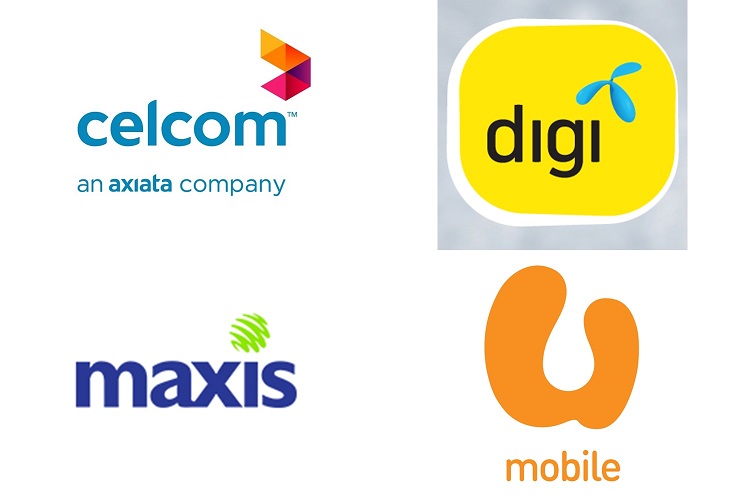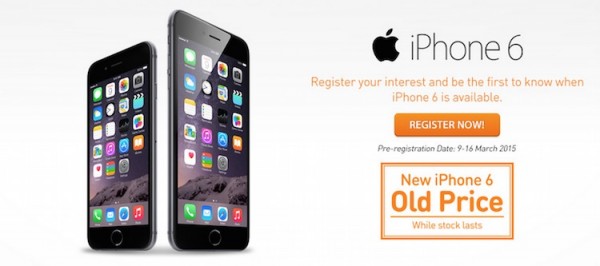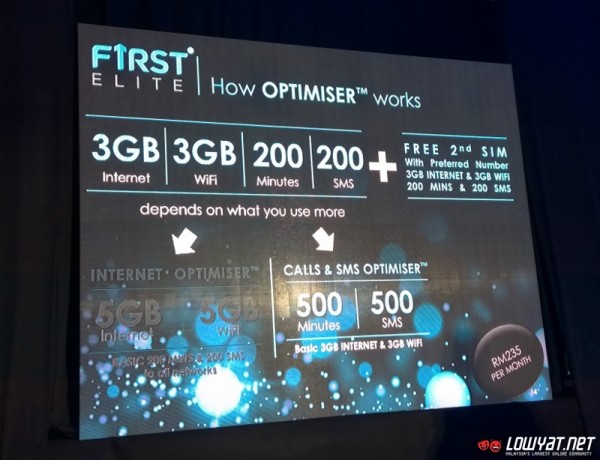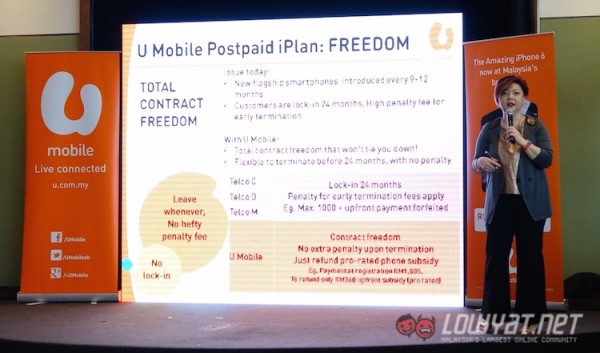Malaysian consumers may not have a lot to cheer about these days, as the onset of GST in less than two days painting a gloomy picture for all of us. However, there is something to be happy about, and it’s from an unlikely source: the “necessary evils” that are our local telcos.
U Mobile – the smallest among the Big 4 telcos in Malaysia, announced its first-ever iPhone postpaid plan a few weeks back. Of course it had to be for the iPhone, one of the most popular smartphones in the country, that U Mobile revealed its gambit. Not only did the new iPhone plans offer “contract freedom”, the packages were actually very competitive as well.
 TL;DR: these plans are very competitive.
TL;DR: these plans are very competitive.
In fact, U Mobile has been on a very aggressive run. Just last year it pushed hard to hit 2 million subscribers – and succeeding. And its refreshed postpaid and prepaid plans – announced in January – were already turning heads with its generous mobile internet data.
Now, with the new iPhone plan, U Mobile is set to shake up the entire industry with some innovative ideas. First, it tore up the traditional idea of a postpaid contract, allowing users to port out without paying hefty penalties. This “contract freedom” mathematically works in favour of the consumer – we tried finding ways of gaming the plan to see if we could get the iPhone 6 or 6 Plus for a total cost that’s lower than RRP…and we did.
Just as important is the fact that this iPhone plan works the same way for both postpaid and prepaid customers, similar to its refreshed UMI postpaid and prepaid plans. Prepaid users could finally enjoy the same plans as postpaid customers have, with generous mobile Internet quota.
Then there’s the microcredit loan that allows users to take home a new smartphone with the same benefits as paying with a credit card without using one (though at a fixed interest rate). Sure, this is a very dangerous scheme considering the spendthrift nature of Malaysia’s youth, but this service will offer convenience to those who need it.
One just needs to take a look at the lines forming around Berjaya Times Square when the roadshow kicked off on the first day of the campaign to see what Malaysian consumers thought of the new plan and microcredit service.
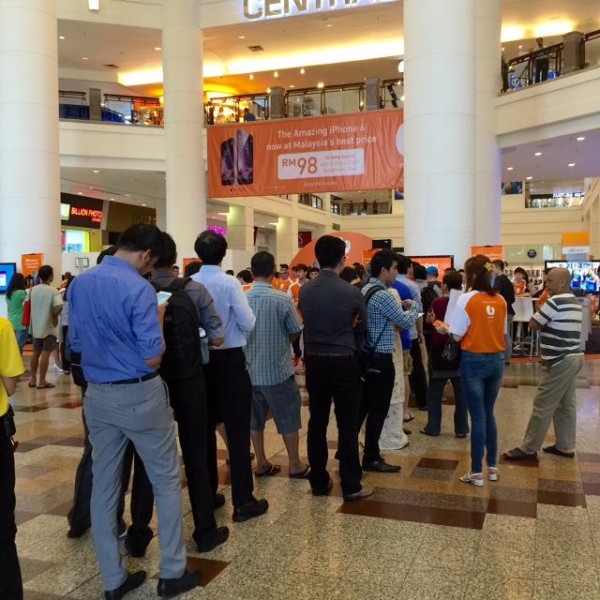 An image posted on U Mobile’s Twitter account
An image posted on U Mobile’s Twitter account
And then, take a look at what other telcos did immediately after. digi’s response was swift and telling: tweaking its Smartplan and finally removing the data split that proved to be uncompetitive. It also increased the data quota and offered a data or call/sms priority system, allowing its subscribers to get more of what they need.
If that sounds familiar, that’s because Celcom had a similar idea for its new postpaid plans announced in December last year. The plans were par for the course, but they had something Celcom called Optimiser, which boosts either data quota or free minutes/sms when you’re close to hitting your quota.
The only telco which looks like its slightly behind the curve is Maxis, which decided to move in the opposite direction with its One Plan. It offered unlimited calls and SMS for a fixed amount every month, but with one of the lowest data quota around. That being said, there are some very innovative ideas implemented in Maxis’ back-end, allowing it to offer what it calls an “unmatched customer experience”, including no bill shocks (free calls/sms, sms alerts, etc), giving the customer complete peace of mind. Perhaps this is why the take-up rate for the One Plan has been encouraging.
On top of that, let’s also not forget Maxis was the first telco to offer free basic Internet long before any telco dared to do so. In September 2013, this was a groundbreaking announcement, offering all #Hotlink users free access to the Internet. It wasn’t fast by any means, but it is more than adequate for instant messaging apps – essentially lowering the barrier of connectivity.

If there’s any proof needed of how far ahead this plan was from the competition, there’s Celcom’s Xpax announcement two weeks ago. The telco announced that its prepaid arm is now offering free 64kbps Internet after your prepaid mobile Internet quota has been exhausted. Arguably, Maxis’ offering from 2013 is more competitive, since it doesn’t require users to subscribe to any high-speed mobile Internet plans before dropping to 64kbps when the quota has been exhausted.
Of course, that doesn’t mean we shouldn’t be expecting even more from Malaysia’s local telcos. Contract freedom is great, but you know what would be even better? Device subsidies that actually make you stick around. Let’s not even look in the US for significantly lower device prices; in Singapore there are plenty of examples where device subsidies make it worth the consumers’ 1- or 2-year long commitment. If these countries can do it, why can’t our telcos?
And, if you take a look at some of the things T Mobile is doing in the US, it’s making even this “contract freedom” feature seem like a minor benefit. T Mobile’s Data Stash is one such example. The idea that unused data can be rolled over to the next month seems almost like a no-brainer feature all consumers should enjoy, but as it stands no Malaysian consumer is being offered this benefit. Let’s not even go into UK telco 3’s “eat all you can” prepaid data pack for just £17 a month.
With the most recent round of fines dished out by the Malaysian Commission for Multimedia and Communications (MCMC) on all four major telcos, there is still plenty of room for improvement.
It took the smallest of the so-called Big 4 in the mobile telecommunications industry to shake the other three into action. What U Mobile has done this past week has finally set the ball rolling, with the ultimate outcome that will only benefit the consumer.
One of my favourite quotes I’ve come across working in this industry is “competition breeds innovation” – and I’m happy that this simple yet powerful quote has proven itself to be true once again.
Follow us on Instagram, Facebook, Twitter or Telegram for more updates and breaking news.


